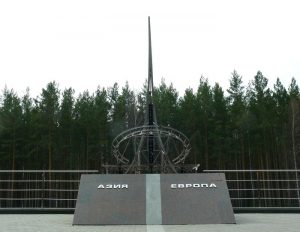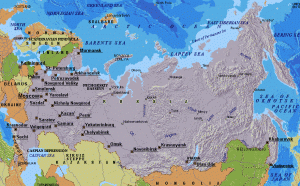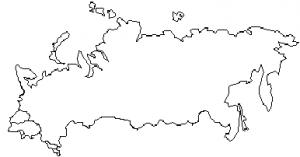84 Russian Domain
How do we define this region?
Regional geography studies the people and places of a cohesive region. A “region” is defined to be an area with multiple shared elements over a range of categories, including both physical and human geographic characteristics. The secret of creating a region, which is a human construct not a naturally begotten unit, is to cluster together as many similarities as possible, while excluding geographic differences.
In some cases, the determination of a geographic region is simple. South America obviously is an intact continent, but also possesses many shared features in a variety of geographic categories. In contrast, the region of North Africa and the Middle East (or Southwest Asia and North Africa) is very problematic to create, define, and limit.
Seen in the map above, Russia presents its own set of challenges to the regional geographer. Its sheer immensity as a land area causes Russia to straddle two continents – Europe and Asia. Some people contend that Russia should be a part of Europe. Indeed, Russia to the west of the Ural Mountains is termed “European Russia.” In this part of the country, Russians have tended to look to Europe for inspiration and for a common outlook. In some cases, Russian leadership, particularly Tsar Peter the Great, intensified this focus, even bringing skilled Europeans to Russia to promote European ideals and culture. Additionally, a dominant majority of Russia’s population lives west of the Urals. Though the daily life and setting of Soviet cities Moscow and Leningrad little resembled that of European cities outside the Eastern bloc, contemporary Moscow and the now renamed St. Petersburg dramatically do feature much of that found in cities throughout Europe.

Unfortunately, this European categorization fails to account for the substantial majority of Russia’s land that is east of the Urals and stretches to the Pacific Ocean. Visibly nonsensical to include Pacific coastal areas in Europe, this approach also does not account for a variety of Asiatic peoples in Siberia, including the descendants of the historically significant Mongols who once controlled huge sections of what is now Russia.
The option to construct Russia as an Asian region is a poorer choice. While the landmass of Russia mostly is positioned north of areas recognized as Asia, its Asiatic peoples are a distinct minority population. The dominant majority population of Russians clearly is neither racially nor culturally Asian. With this Asian option, it can be noted that over 75% of Russia’s area is considered to be in Asia.
A third option is to split the country in two pieces regionally; however, this choice presents an onerous position to geographers. The modern political world is fully patterned in the State model, with specifically delineated international borders. Taking one State and then dividing it into two pieces for separate placement into regional schemes is like compelling a married couple to take jobs living separately in cities far distant from each other. There may seem to be some usefulness at the start, but as a lasting choice, it is intrinsically flawed. But, if you want to go with this choice of splitting up Russia, then the common tactic is to divide Russia at the Ural Mountains.
Yet another option is the establishment of Russia as a region itself. For some this may seem intuitively wrong. How can a single country be a region? Although Russia would be the only such region in the world, other regions do come close to this pattern. Australia dominates the region called Oceania, though New Zealand and a host of small Pacific islands also fit in the region. North America, as separate from Latin America (which includes Mexico), is a region of just two countries – the United States and Canada. Additionally, Russia’s colossal area is larger than many of the world’s established regions. In fact, Siberia itself is more than twice as large as Europe (not counting any of Russia as belonging to Europe). While Russia is a multinational State with dozens of ethnic minorities, one nation, Russians, has dominated these minorities for a long period of history; thereby embedding Russian culture as the dominant social element throughout the country. With Russia as the dominant successor State to the USSR in area, population, and clout, there is further logic in defining Russia as a region.
In a 2019 survey done by the Levada Center, Russians were asked, “To what extent do you presently identify yourself with Western culture?” The data for this study was collected in May and June 2019 from 1,600 respondents aged 14–29. Only twenty percent of the respondents answered in a positive way, choosing either “I always remember it” or “It is quite important to me.” The survey also inquired, “Do you fully agree, rather agree, rather disagree, or strongly disagree with the statement ‘Russia is a European country’?” Only 36% agreed. Note that young people are the ones who are least connected to Soviet days, being born after or as the Soviet Union dissolved. These young Russians are the people who should be the most likely to connect Russia to the relative prosperity and freedom of Europe. Their limited connection to Europe suggests that the choice of selecting Russia as its own region still remains better than placing part of Russia in Europe.

Or, Russia could be the core of a slightly larger region that could include ethnic partners Ukraine and Belarus and/or historical linked partners Georgia and Armenia. Given the dominant Slavic ethnic composition of Ukraine and Belarus, this is an easy fit with Russia. Though Georgians and Armenians fit in distinctly separate ethnic groups not connected to Russians, both groups have modern historical connections with Russia. Neither Christian country could fit with southern neighbors in the Islamic Middle East, yet both are separated from Europe by long stretches of land in Russia and Ukraine, as well as by the Black Sea. Given these difficulties, the placement of Georgia and Armenia with Russia is not unreasonable. Similarly, sometimes Moldova is added to this region, though others will note Moldova’s links with Romania in order to place Moldova in Europe. This broader region could be called the Russian Domain.

In evaluating these choices, the evidence is weighted to favor either of the last two choices – Russia as its own region or Russia as the main section of the Russian Domain.
Exercises
During the Soviet period the question of region was more easily answered. Due to its communist format, the USSR often was defined as a single region. The end of the USSR brought the creation of fifteen countries and their placement into different regions.
- Europe – Estonia, Latvia, Lithuania, (Moldova)
- Central Asia – Azerbaijan, Turkmenistan, Kazakhstan, Kyrgyzstan, Tajikistan, Uzbekistan
- Russian Domain – Russia, Ukraine, Belarus, Armenia, Georgia, (Moldova)
Cited and additional bibliography:
Gudkov, Lev, Natalia Zorkaya, Ekaterina Kochergina, Karina Pipiya, and Alexandra Ryseva. 2019. “RUSSIA’S ‘GENERATION Z’: ATTITUDES AND VALUES.” http://library.fes.de/pdf-files/bueros/moskau/16134.pdf.
Jerka.h23. 2015. Border of Europe and Asia near Yekaterinburg. https://commons.wikimedia.org/wiki/File:Yekaterinburg_Border_Asia_Europe.jpg. CC BY-SA (https://creativecommons.org/licenses/by-sa/4.0).
Koester, Larry. 2015. Map of Russia. https://tinyurl.com/maprussia. Attribution 2.0 Generic (CC BY 2.0).
Richardson, P.E. 2003. “Does Russia Matter?” Russian Life 46 (6): 4.
“What Continent Is Russia In?” 2019. YouTube Video. YouTube. https://www.youtube.com/watch?v=MHlm1EAUf7k&vl=en.


